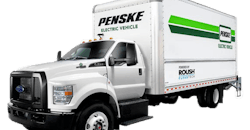Proterra Inc. recently announced an agreement with ROUSH CleanTech and Penske Truck Leasing, under which the Burlingame, California-based company will supply its battery technology to ROUSH CleanTech for the development of its next-generation Ford F-650 all-electric commercial truck.
ROUSH CleanTech will integrate its advanced clean technology and control systems to leverage Ford’s medium-duty chassis and Proterra’s battery technology to Penske Truck Leasing, which will be the first customer for this next-generation product. In addition, the three companies will collaborate on continued fleet electrification, including charging and an ecosystem of solutions that will make the transition to electric more seamless for fleets.
The all-electric ROUSH CleanTech Ford F-650 is a purpose-built Class 6 commercial electric vehicle that is available in several configurations including utility trucks, shuttle buses, and box trucks.
Built on the Ford’s F-650 chassis, the vehicle will be equipped with Proterra’s H Series battery systems. Designed for packaging between frame rails, the Proterra H Series battery system powering the F-650 can provide 165 kilowatt hours of energy to deliver an estimated 125 miles of vehicle range on a single charge, while supporting an available payload of nearly 8,500 lbs. ROUSH CleanTech expects to deliver the next-generation Ford F-650 in Q2 of 2023 to Penske Truck Leasing.
The latest partnership is the latest in a list of collaborations announced this year including one with Komatsu to electrify construction equipment as well as partnerships with Lightning eMotors to power cargo vans and Volta Trucks to address delivery trucks. In all, Proterra Powered now has nine partnerships with commercial vehicles manufacturers to help electrify delivery vans, school buses, coach buses, low-floor shuttles, construction equipment and other 100% electric vehicles.
Claire McConnell, vice president of strategic partnerships at Proterra, tells IndustryWeek these collaborations are “representative of the important role that partnerships can play in accelerating the adoption of commercial electric vehicles.”
By supplying electric vehicle technology to commercial vehicle manufacturers, Proterra “can help OEMs move faster towards electrification. Indeed, many commercial vehicle manufacturers are used to the outsourcing model,” she says. “This level of partnership is applicable across the commercial vehicle market, from electric school buses through heavy-duty trucks and off-road industrial equipment.”
Proterra’s experience as the leading manufacturer of electric transit buses in North America provides it with a roadmap for electrification to share with customers, explains McConnell. “As our Proterra Powered business has grown, we are also applying learnings from our partners to improve our offerings and deliver a more comprehensive electrification solution,” she says. “This includes delivering new, flexible battery technology systems to power a wide range of commercial vehicle applications. Last year, we introduced our H Series battery pack to increase flexibility for Proterra Powered customers to electrify even more commercial vehicles. The H Series pack will power the next-generation Roush CleanTech Ford F-650 all-electric commercial truck, announced earlier today.”
At the same time, McConnell stresses that Proterra is more than just a battery supplier, working closely with partners to provide an end-to-end electrification solutions. “This includes collaborating with our partners on everything from charging and infrastructure to service and support for end-use customers,” she says. “For example, in our partnership with Thomas Built Buses, we offer a full end-to-end powertrain solution including battery technology, high voltage systems and controls, and drivetrain for the Saf-T-Liner Jouley electric school bus.”
Of course, as the commercial vehicle market rapidly moves towards electrification there are learning curves along the way and challenges to overcome. “Charging and infrastructure, for example, is critical to help fleet operators electrify their vehicles. Across both our Proterra Powered and Transit businesses, our customers have told us they would like to move faster towards electrification, but charging remains an obstacle to adoption,” she says. “That’s why we are investing in our Proterra Energy business to deliver charging solutions to help our customers fuel their electric vehicle fleets.”
About the Author
Peter Fretty
Technology Editor
As a highly experienced journalist, Peter Fretty regularly covers advances in manufacturing, information technology, and software. He has written thousands of feature articles, cover stories, and white papers for an assortment of trade journals, business publications, and consumer magazines.
